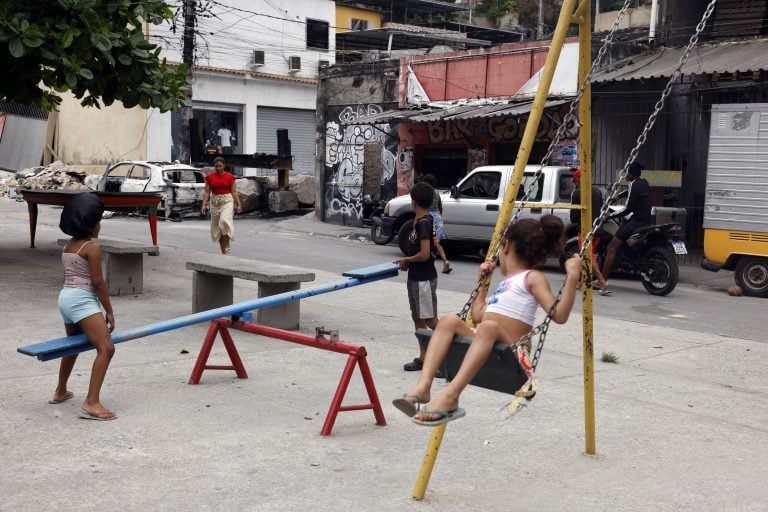Constant shootings affect the development of children in communities.

Bodies lined up. Drones dropping explosives. Armored vehicles and rifles. Burning vehicles. Buses blocking the streets, obstructing the advance of police cars. Tracer ammunition streaking across the sky over the Alemão and Penha complexes in the northern zone of Rio de Janeiro.
The images recorded last Tuesday, the 28th, the day that state security forceslaunched the so-called "Operation Containment" in Rio de Janeiro, circulated around the world. Evoking a scenario of urban warfare, they highlighted the vulnerability of the population. And they reinforced the conclusion of several studies: in addition to the immediate consequences, urban violence has lasting effects , also harming the mental health of people directly or indirectly exposed to the feeling of insecurity.
According to experts interviewed by Agência Brasil , by transforming fear into a state of permanent alert, urban violence affects the functioning of the nervous system, harming psychosocial development, especially in children and adolescents. This is particularly true for those forced to live with frequent shootings in areas controlled or disputed by criminal organizations.
Stress"Exposure to urban violence can create extremely high levels of stress, affecting people's health," stated psychologist Marilda Lipp, a leading expert in stress studies.
For her, the search for security is one of the most basic human needs, second only to physiological needs (breathing, eating, drinking, sleeping). Thus, feelings of personal, family, or community insecurity tend to cause serious emotional disturbances that, depending on the case, can lead to symptoms associated with chronic anxiety or depression (tachycardia, high blood pressure, gastrointestinal problems, sleep and appetite disorders, irritability, and difficulty concentrating, among others).
“The stress response is physiological. When people feel threatened, their brains release substances [hormones] that prepare them to flee or confront the danger – that is, to fight. That's why we say that a certain level of stress is normal. The problem is that no body, no mind, can withstand being in a state of permanent alert as happens with people who are repeatedly exposed to violence or threats,” the psychologist noted.
For Marilda, the reactions and consequences of exposure to violence and feelings of insecurity vary from person to person, depending on the meaning each individual gives to the events they experience directly or indirectly.
“Even so, it’s not entirely wrong to say that people subjected to high levels of stress, repeatedly and for prolonged periods, are susceptible to illness. Even so-called secondary victims, people who are not directly exposed to the risks, nor have relatives, friends or close people threatened, even they can be affected to some degree and feel powerless and helpless,” added the psychologist.
Marilda, creator of the so-called Stress Control Training, a self-treatment model she developed from other approaches, argues that the government should offer the population training to deal with stress in a healthier way.
“Without mentioning the political and structural aspects of the issue, which need to be addressed, I believe this would already help many people, especially those who cannot afford a psychologist or psychiatrist or who have difficulty finding the necessary care from these professionals in the public system,” stressed the psychologist, arguing that the training could be offered in public health units of the Unified Health System (SUS) and schools. “It is very important to teach our children how to better cope with stress,” she concluded.
 Rio de Janeiro (RJ), October 30, 2025 – Children play in a square in Vila Cruzeiro next to barricades that were put up to contain the advance of police during Operation Containment. Photo: Tânia Rêgo/Agência Brasil
Rio de Janeiro (RJ), October 30, 2025 – Children play in a square in Vila Cruzeiro next to barricades that were put up to contain the advance of police during Operation Containment. Photo: Tânia Rêgo/Agência Brasil
Associate professor at the Institute of Psychiatry of the Federal University of Rio de Janeiro (UFRJ), psychiatrist Octávio Domont de Serpa Júnior assures that the demand for health services always increases after events that generate commotion and amplify the feeling of insecurity.
“In Rio de Janeiro, we have observed for some time that these situations impact the demand on the primary care network, which is the gateway to the public health system. Therefore, I believe that many people who were directly or indirectly exposed to what happened in the Alemão and Penha complexes this week will end up seeking a health unit in the coming days, if they haven't already,” commented Domont, highlighting that the issue transcends individual suffering.
“There is also collective suffering. This is a structural, political, and social issue that we cannot ignore. Without a response that does justice to this collective dimension, this problem will continue to impact everyone,” Domont stated.
“It is important that healthcare professionals are able to respond promptly, welcoming and offering appropriate care to both the direct victims of violence and those who witnessed it. This is so that the symptoms do not become chronic. Especially given the real possibility that many of these people will be exposed to this type of situation again, since, apparently, there is no solution to the public safety problem in sight at the moment,” concluded the psychiatrist.
CartaCapital


